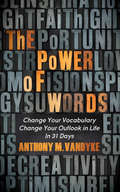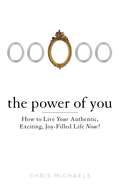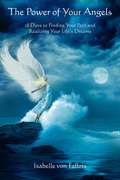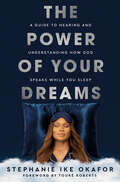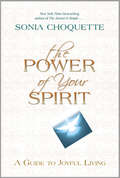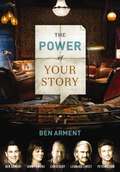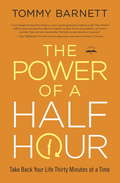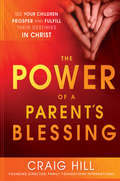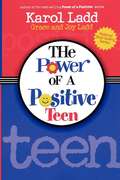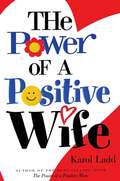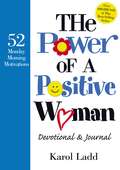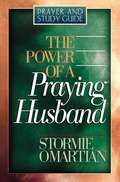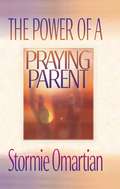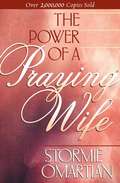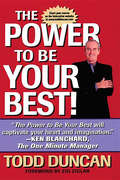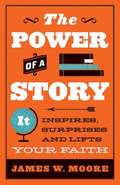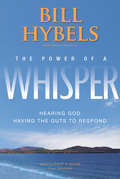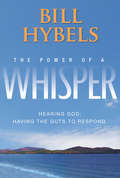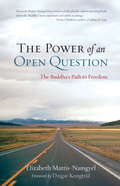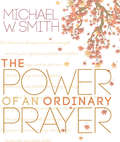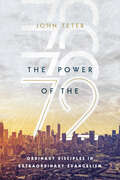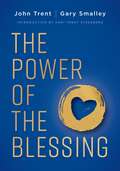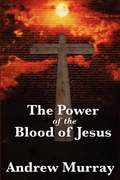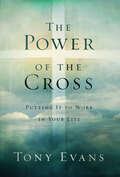- Table View
- List View
The Power of Words: Change Your Vocabulary Change Your Outlook in Life In 31 Days
by Anthony M. VanDykeA unique devotional that shows how to find deeper meaning in your words—and in your life. The Power of Words takes ordinary words that we use daily and reveals their surprising potential to do both good and harm—showing how our spiritual lives can be shaped by our understanding of them. Just as the words of the Lord can uplift and guide us, so can the vocabulary we use with ourselves and others. Discover how important words can be, and harness their power for hope, healing, and success, in this inspiring book from an author who has been a business leader, an athletic coach, and a popular gospel radio personality.
The Power of You
by Chris MichaelsPractical, motivating, and inspiring ways to unleash your potential-from one of today's most exciting spiritual teachers! You are a masterpiece. You have everything you need right now to create your life exactly as you want it to be. Successful people will often say that when they're at their peak performance level, they feel a sense of some other presence with them-something beyond themselves. That other presence seems bigger than their own talent or personality. The Power of You guides listeners in discovering the other presence that resides within all of us. As author and spiritual director Chris Michaels shows, once we are able to tap into this presence, we can use it to help improve every aspect of our lives.
The Power of Your Angels
by Isabelle Von FalloisAccessible and effective, this succinct guide reveals a 28-day program designed to correct toxic behavior patterns so that readers can connect with their true essence. Positing that it takes 21 to 28 days to break old habits, this personal journey features a daily, channeled angel message for each step of the curriculum. Offering exercises, rituals, and case studies, this step-by-step process increases daily contact with personal angels and helps to form a more positive belief system, so that synchronicities and miracles become a standard part of life. Complete with meditations, real-life examples, and pragmatic suggestions for action, this dynamic tool is for anyone hoping to realize their dreams.
The Power of Your Dreams: A Guide to Hearing and Understanding How God Speaks While You Sleep
by Stephanie Ike OkaforNATIONAL BESTSELLER • How would your life look if you gained years of wisdom, guidance, and strategy while you were asleep? That&’s exactly what you receive when you tap into the power of God&’s voice in your dreams!&“The Power of Your Dreams isn&’t just words on a page; it&’s a tool every believer needs to receive personal instruction for their destiny!&”—Travis Greene, pastor, recording artist, and author The average person spends twenty-six years of life sleeping. That time was created not only to enjoy the physical benefits of rest but to engage in the presence of God and access His guidance for our days. Through fascinating real-life stories, Pastor Stephanie Ike Okafor reveals how dreams have equipped her and many others throughout history, and she shows how you, too, can receive revelation from God through your dreams. Anchored in biblical truth, The Power of Your Dreams answers your most perplexing questions about dreams:• Are all dreams from God?• How do I know if my dream contained a message from God?• How do I interpret my dreams?• Do nightmares have any meaning? God spoke to His people through dreams in biblical times. Today He speaks to you in the same way, inviting you to unlock hidden treasures of wisdom. Discover richer clarity and confidence in your purpose as well as enjoy a strengthened relationship with God as you learn how to recognize and respond to His voice in your dreams.
The Power of Your Spirit: A Guide To Joyful Living
by Sonia ChoquetteLosing our connection with Spirit may be the biggest problem we suffer from today. We want to face our challenges and disappointment with grace; be creative and inspired; feel excited by a purpose; and live fearlessly through an intuitive, guiding wisdom. We want to love and feel loved, and realize genuine peace . . . but as much as we desire a significant spiritual breakthrough and long to know our Divine selves, we’re still not making the commitment that will ensure our success. We want the gifts, but we’re not engaging in the practical work necessary to obtain them, so we remain stuck and more frustrated than ever. We know a lot about the power of Spirit, yet we aren’t actually experiencing it. And we cannot do so through intellectual pursuits alone. In fact, we can only experience it through a deep, intentional daily practice of connecting with Spirit. When you truly make this connection, you’ll realize that it’s the most authentic, lasting power you have in your life. In this enlightening book, spiritual teacher Sonia Choquette will show you that even though you can’t control the outside world, with the power of your Spirit, you can create a sense of purpose within that brings about profound contentment and personal peace—no matter what is going on around you.
The Power of Your Story: Conversation Guide
by Ben ArmentWhat is your story? We all have stories. Some are funny, some are painful--all contribute to who we are. What we don't always see is that God is weaving an overarching story that started before time, extends through history, and will reach far beyond our lifetimes. God extends an invitation to each of us to step into His story and experience the ongoing narrative of His Word in our lives. In this unique study, you will join visionary author Ben Arment and four of the most creative and effective communicators in the church today--Leonard Sweet, Chris Seay, Pete Wilson, and Ginny Owens--as they reveal some of their personal stories and expound on key stories in King David's life. You will examine the concepts of backstory, setting, plot, conflict, and resolution within the life of David and within your own life. Step into the power of God's story and see where He can take yours. Conversation Guide includes:Seven sessions of Scripture study / Daily readings for personal reflection between each session / Conversation starters and discussion questions to use with your small group. Intended for use with The Power of Your Story DVD-Based Study (ISBN: 9781401677237).
The Power of a Half Hour: Take Back Your Life Thirty Minutes at a Time
by Tommy BarnettTurn your fleeting minutes into defining moments. What can you do in 30 minutes? Have lunch? Watch television? Check Facebook? How about change your life? Why do some people achieve far more than others? We all get the same 24 hours in a day, yet a special few seem to have superhuman abilities when it comes to accomplishing great things in life. Tommy Barnett, a proven master at "getting things done," says the key to maximizing your productivity is to make use of small, manageable moments in your day--just 30 minutes at a time. In this remarkably practical book, Tommy shows how to begin a whole new life of fruitfulness. You'll see immediate results in all areas of your life, including your-- · Purpose and values · Personal goals · Faith · Character and attitude · Dreams · Career · Relationships · Marriage and family · Church involvement and ministry Why not change time from being your worst enemy to your everlasting friend? It all starts with the amazing things you can do in only a half hour. Through inspiring stories and biblical principles, discover how your downtime can have a major upside. Get going--you don't have a minute to lose!
The Power of a Parent's Blessing: See Your Children Prosper and Fulfill Their Destinies in Christ
by Craig HillYou were created to be God’s agent of blessing to your children Blessing is a custom established by God and is meant to function in every family. In fact, there are seven critical times in each of our lives when God wants to give us a powerful message of identity and destiny. In The Power of a Parent’s Blessing Craig Hill explains each of these times, answering key questions such as: · What is the key identity question to be answered in your child’s heart? · When is the appropriate time to bless? · What are potential consequences of not blessing? · What is the role of each parent in blessing at this specific time? · What are practical tools to use in blessing? It is never to late to start your children on the road to fulfilling their destinies. Whether you are a parent, grandparent, or step-parent, these powerful blessings will help the children in your life to prosper.
The Power of a Positive Teen
by Karol Ladd Grace Ladd Joy LaddImagine getting the shared views of a mom and her teenaged daughters as they all grow together. That's the unique vantage point the Ladds bring as they explore ways for adolescents to truly add something positive to their spheres of influence. Organized into seven power principles such as "The Power of Confidence," "The Power of Integrity," and "The Power of Responsibility," readers gain the individual perspectives of the three coauthors as well as their combined wisdom.
The Power of a Positive Wife GIFT
by Karol LaddWhether you're happy in your marriage or struggling to survive, this book is all about how you can become a positive influence in your marriage. And believe it or not, being a positive wife has nothing to do with your husband -- it has to do with you and who you are in God. Through seven biblical principles, Karol Ladd shares how any woman can be a positive (not perfect) wife as she builds a deeper, more meaningful relationship with her husband. In its pages you will find: helpful hints on the art of arguing how to practice the gift of forgiving practical suggestions on how to respect your husband great date ideas advice on handling financial responsibly This creative book is a "vitamin boost" that will nourish your spiritual, physical, mental, and emotional growth. Now you can becomethe positive wife you've always wanted to be!
The Power of a Positive Woman Devotional GIFT
by Karol Ladd52 Powerful Devotionals for the Busy Woman What woman doesn't yearn for a few moments of reflective peace and serene quiet in the presence of God? Yet, most women wear too many hats and feel pulled in too many directions to stop for this much-needed refreshment. Best-selling author Karol Ladd has helped hundreds of thousands of women overcome this negative world to become a positive force. There intimate moments with God will fill you with inspiration and instill you with the courage to be the positive woman you want to be. Each devotional includes: an inspirational scripture a positive message encouraging quotes a prayer guided journaling sections proactive choices for living Beginning in Genesis and moving through the Bible, these inspiring, practical devotions will increase your faith and help you to be a positive woman all week long.
The Power of a Praying Husband Study Guide
by Stormie OmartianThis is a study guide for The Power of a Praying Husband. The user may want to use it with a wordprocessor in order to fill out the blanks.
The Power of a Praying Parent
by Stormie OmartianA book on how you can pray through every stage of your child's life.
The Power of a Praying Wife
by Stormie OmartianThe author shares how God strengthened her relationship with her husband, as she began to pray consistently for him, concerning key areas of his life: his emotions, his role as a father, the choices he makes, etc. She also gives other examples of how God has worked in difficult situations, in response to a wife's fervent prayers. Each chapter is filled with encouraging Scriptures and ideas for prayer.
The Power of a Promise
by Todd DuncanThis course was designed to teach you how to do one thing: close the gap between what is promised and what is performed in your life. A lot of people feel the sting of living a life that is less than what they had expected--you don't have to be among them!Todd Duncan presents to you compelling new ideas in language that is easy for anyone at any stage of personal growth, career, and spiritual walk to understand.
The Power of a Story: It Inspires, Surprises and Lifts Your Faith
by James W. MooreIn this book, popular author James W. Moore talks about the power of a story, such as those told by Jesus in the Bible. The author recalls, "I would be sitting there in the sanctuary of our church, doing what young boys do in church, drawing pictures on the back of the bulletin, working puzzles, looking constantly at Granny’s watch, wishing the seconds hand would move faster, daydreaming about sports, kicking my feet in the air impatiently, counting the organ pipes . . . And then, the preacher would start telling a story, and I was hooked. He had my full attention. I couldn’t wait to hear the story!" Jesus knew the importance of telling stories to convey a message or a Biblical truth and used this technique often when speaking or ministering to others throughout the Bible in the form of parables. Stories are a natural way to give detail and perspective while teaching an important point.
The Power of a Whisper Participant's Guide: Hearing God, Having the Guts to Respond
by Bill Hybels Ashley WiersmaGod still speaks, is anyone listening? Join bestselling author and pastor Bill Hybels in this four-session video-based study where your group will learn to navigate life through whispers from God. Through this dynamic teaching and group study, you will learn to practice hearing from God, surrender to the voice of God, obey his promptings and become a more effective kingdom-builder. This Participant’s Guide is designed to help facilitate group discussion and further study alongside the Power of a Whisper DVD. For more information go to: www.thewhisperwall.com.
The Power of a Whisper: Hearing God, Having the Guts to Respond
by Bill Hybels Wayne Cordeiro“Without a hint of exaggeration,” says Bill Hybels, “the ability to discern divine direction has saved me from a life of sure boredom and self-destruction. God’s well-timed words have redirected my path, rescued me from temptation and re-energized me during some of my deepest moments of despair.” In The Power of a Whisper, vision is cast for what life can look like when God’s followers choose to hear from heaven as they navigate life on earth. Whispers that arbitrate key decisions, nudges that rescue from dark nights of the soul, promptings that spur on growth, urgings that come by way of another person, inspiration that opens once-glazed-over eyes to the terrible plight people face in this world—through firsthand accounts spanning fifty-seven years of life, more than thirty of which have been spent in the trenches of ministry, Hybels promotes passion in Christ-followers' hearts for being wide open to hearing from God, and for getting gutsier about doing exactly what he says to do. For more information go to: www.thewhisperwall.com.
The Power of an Open Question: The Buddha's Path to Freedom
by Dzigar Kongtrul Elizabeth Mattis-NamgyelHow do we find a resting place in a world that is complex and always changing? How do we practice spirituality beyond the limits of blind acceptance and doubt? Elizabeth Mattis-Namgyel proposes that when we ask challenging questions like these, we access our deepest intelligence and most powerful insights. "When we ask a question," she suggests, "our mind is engaged yet open. The process of inquiry protects us from our tendency to reach static conclusions. Instead, we can respond to uncertainty and change with inquisitiveness and a sense of wonder." Her book guides us on a provocative, playful, and spiritually enriching journey of contemplation that could last a lifetime.
The Power of an Ordinary Prayer: The Extraordinary Power Of An Ordinary Prayer
by Michael W. SmithSomething wonderful and life-changing has been happening at Michael W. Smith's concerts. Recently he began closing the evening with a simple prayer of blessing woven from Scripture. The response has been overwhelming. The emails and letters of testimony are like nothing he has ever experienced in his 25 years of ministry. Far from being a 'magical' formula for extracting wealth and possessions from God, he has discovered that God's blessings are measured more by the flourishing of character in adversity than by the flourishing of stuff. The amazing result of God's true blessing is overflowing joy and peace. Unfortunately, many are robbed of the promise of blessing because they seek to be blessed more than to bless others. This beautiful work, written with writer Thomas Williams, will inspire readers to examine their hearts and learn to experience God's blessing as they seek to bless others, thus discovering the secret to drawing near to the heart of God.
The Power of the 72: Ordinary Disciples in Extraordinary Evangelism
by John TeterThey were not professionals. They were not celebrities. We don't even know their names.We know very little about them, except that they were everyday people who were drawn to Jesus. When Jesus asked them to join him in his mission, they stepped up, answered the call, and went out in his name. And amazing things happened as a result. They were the 72. Pastor and evangelist John Teter explains how Jesus trains ordinary people to accomplish an extraordinary mission. He unpacks the story of the sending of the 72 to reveal how they were equipped in evangelism and discovered opportunities to herald God's kingdom in concrete and tangible ways. Filled with vivid stories of Teter's remarkable experiences in ministry and church planting, this book shows how we can live out God's call and witness the transformation of those around us. You too have been called by Jesus. Discover how God empowers you to play your part. Welcome to the 72.
The Power of the Blessing: 5 Keys to Improving Your Relationships
by Gary Smalley John TrentIn this newly revised and abridged version of John Trent and Gary Smalley's bestseller The Blessing--more than one million copies sold--learn how the biblical gift of "The Blessing" is key to your self-worth and emotional well-being. People of every age long for the gift of The Blessing--the unconditional love and approval that comes from healthy relationships with your family and with the world around you.This life-changing gift is essential for instilling a deep sense of worthiness and unshakable emotional well-being. In The Power of the Blessing, you'll learn about these five keys to improving your relationships:Meaningful, encouraging touchA confirming spoken messageAttaching high valuePicturing a special futureAn active commitmentOffering solid, practical advice and a fresh perspective on making this gift a bigger part of your family, The Power of the Blessing effectively communicates these biblically based elements as necessary to prepare you for positive future relationships, including your relationship with a loving God.Written for women and men alike, The Power of the Blessing offers five keys to create a lifestyle of blessing others, including your family and those you love. Your words are powerful, and they have the power to crush or edify. God has always been interested in blessing his people, and we are called to bless others. Choose to speak the power of the blessing today!
The Power of the Blood of Jesus
by Andrew Murray"The Power of the Blood of Christ" does a wonderful job of introducing the need for Christians to claim the blood of Jesus, and in confirming its biblical authenticity. In a day when the blood of Jesus is being removed from the very translation of the Bible itself, when the mention of the blood of Jesus is considered offensive even in the churches, it is more important than ever for this book by Andrew Murray to remove the misconceptions. "The Power of the Blood of Christ" is a God-send for those who are willing to accept the ways of God without cringing. Though the blood of Jesus is not in any way magical, it is nonetheless crucial and foundational to receiving any benefit whatsoever from God. In "The Power of the Blood of Christ," Andrew Murray clearly shows this truth in his books. He also mentions scores of benefits that are only available through the shed blood of Jesus. This book remains a Christian classic, a tremendous discourse on "The Power of the Blood of Christ." The New Testament book of Hebrews states that, "Without the shedding of blood there is no forgiveness of sin." Andrew Murray shows clearly that within that statement is included ALL the resulting benefits of forgiveness, as well.
The Power of the Cross: Putting it to Work in Your Life
by Tony EvansThe cross is an historical event that can bring us to heaven…And a current event bringing heaven to bear on usIn The Power of the Cross, Tony Evans applies Christ&’s work to life today. In three parts, he systematically and pastorally explains three aspects of the cross:Its Person: What makes Christ unique, and how He is the center of salvation historyIts Purpose: What was accomplished on it, and how it is to be the centerpiece of our livesIts Power: The stability and deliverance it provides in our everyday livingWe wear crosses around our necks, but do we apply it to our lives? Jesus&’ work holds incredible power for us. It&’s time we embrace it, for God&’s glory and our joy. Read The Power of the Cross to find out how.
The Power of the Cross: Putting it to Work in Your Life
by Tony EvansThe cross is an historical event that can bring us to heaven…And a current event bringing heaven to bear on usIn The Power of the Cross, Tony Evans applies Christ&’s work to life today. In three parts, he systematically and pastorally explains three aspects of the cross:Its Person: What makes Christ unique, and how He is the center of salvation historyIts Purpose: What was accomplished on it, and how it is to be the centerpiece of our livesIts Power: The stability and deliverance it provides in our everyday livingWe wear crosses around our necks, but do we apply it to our lives? Jesus&’ work holds incredible power for us. It&’s time we embrace it, for God&’s glory and our joy. Read The Power of the Cross to find out how.
